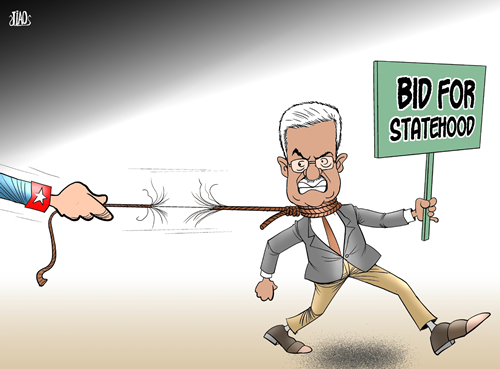Let UN lead in Mideast peace talks
- By Li Weijian
 0 Comment(s)
0 Comment(s) Print
Print E-mail
China.org.cn, October 6, 2011
E-mail
China.org.cn, October 6, 2011
|
|
|
Down to the wire [By Jiao Haiyang] |
Despite strong opposition from the U.S. and Israel, the Palestinian National Authority (PNA) President Mahmoud Abbas submitted its application for full membership of the United Nations (UN), hoping that the act would raise international awareness and concern for their cause.
The Palestinians have won success in this aspect. The UN bid has not only inspired Palestinians' enthusiasm for statehood but also has won positive responses from the international community.
In emergency negotiations, a quartet of Middle East negotiators, including the US, the UN, the European Union and Russia, proposed that Israel and the Palestinians should meet within one month to agree an agenda for new peace talks with a goal of a deal by the end of 2012.
Over the past few decades the Israeli-Palestinian conflict has been managed within a framework in which Israel, the Palestinians and the U.S. are the three main players. Israel and the Palestinians are the two key parties in the conflict while the U.S. acts as a mediator. Due to the strong U.S.-Israel alliance, the Palestinians have always held a relatively weak position in peace talks.
In the past, due to the three-party scheme, the Palestinians have exercised the option of walking out of talks if they felt they were not being dealt with fairly by Israel and the U.S. Within such a framework, it is inconceivable that the Israeli-Palestinian conflict will be justly, fairly and reasonably resolved. Also, since Arab countries have not been regarded as important players in this framework, their proposals are often neglected.
In order to find a just solution to the conflict, the old, irrational, three-party framework must be changed. The Palestinians' recent UN bid is an attempt to shatter the old framework.
Suffering from the severe financial pressures of a struggling economy and the financing of two wars, the Obama administration has lost its capacity to play a major role in Middle Eastern affairs. In the future, with more parties involved, the Mideast peace process will be pushed forward.
Theoretically speaking, if Palestine was recognized as a UN member state, the UN would be able to play a more dominant role in resolving the Israeli-Palestinian conflict.
However, Israel and the Palestinians still need to hold talks and reach agreements on crucial details. History shows that resumption of talks does not necessarily mean that progress will be made. Both Israel and the Palestinians are willing to restart talks but they lack basic mutual trust.
Meanwhile, unrest continues playing havoc in the Arab world. Israel has seen its relationship with its Arab neighbors sour. If it fails to handle its relationship with the Palestinians appropriately, it will become more isolated.
The Palestinians also needs to form a united stance. Without this, they lack the basis for talks with Israel.
Alteration of old three-party framework is beneficial to both sides. The U.S. and Israel have little to lose from multiparty involvement, and hopefully new ideas on how to resolve the conflict will be generated.
The author Li Weijian is the director of Department of West Asian &African Studies at the Shanghai Institutes for International Studies.
(This article was first published in Chinese and translated by Zhang Ming'ai.)
Opinion articles reflect the views of their authors, not necessarily those of China.org.cn.







Go to Forum >>0 Comment(s)